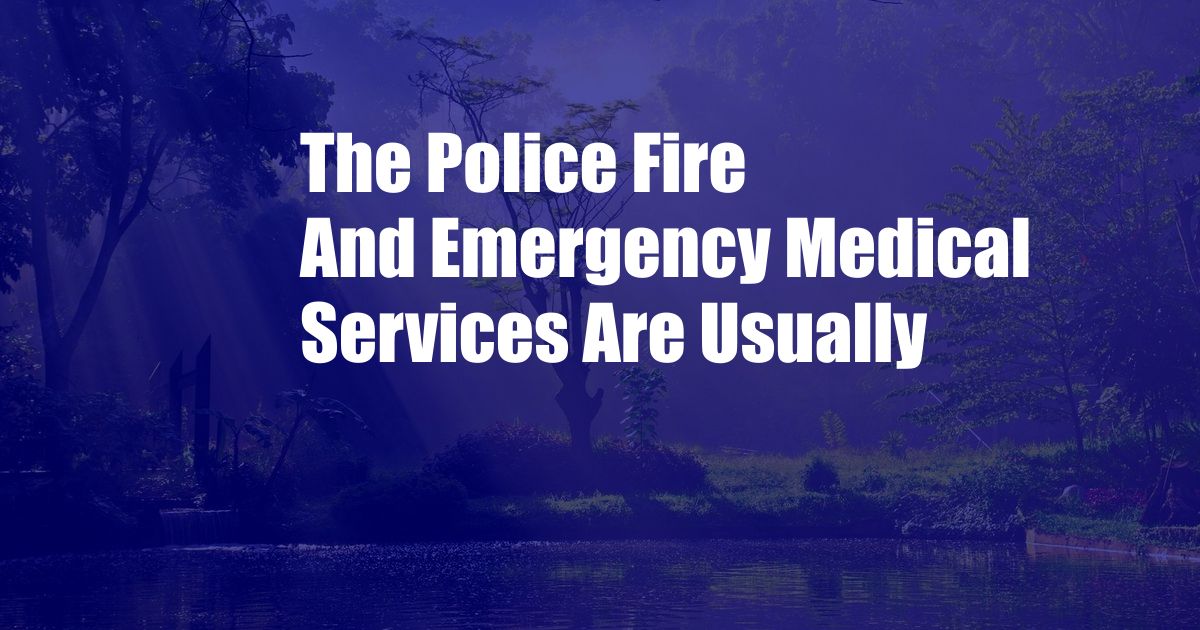
The Unsung Heroes: Police, Fire, and Emergency Medical Services
On a bustling city street, a piercing siren cuts through the noise, its urgency impossible to ignore. As the sleek fire truck races past, a ripple of anticipation runs through the crowd. Seconds later, an ambulance speeds by, its flashing lights illuminating the scene. These are the everyday heroes we often take for granted—the police, fire, and emergency medical services (EMS) personnel who keep our communities safe and protected.
Their presence is a constant reassurance, a reminder that in times of crisis, there are trained professionals ready to respond. Yet, behind the uniforms and equipment lies a world of dedication, sacrifice, and unwavering commitment to serving others.
The Role of Police, Fire, and EMS
The responsibilities of these three essential services are distinct yet interconnected, forming a comprehensive safety net for our society. Police officers are tasked with maintaining public order, preventing crime, and enforcing the law. Firefighters combat blazes, conduct rescue operations, and provide fire safety education. EMS personnel provide emergency medical care, transport patients to hospitals, and offer disaster response support.
Each role demands a unique set of skills and training. Police officers must possess sharp observation, problem-solving abilities, and a strong sense of community. Firefighters require physical fitness, technical expertise, and the ability to work effectively under extreme pressure. EMS personnel need medical knowledge, compassion, and the ability to make life-saving decisions in high-stress situations.
A Deeper Look: Police Services
The police play a multifaceted role in our communities. Beyond enforcing the law, they build relationships with residents, patrol neighborhoods, and conduct investigations. Police officers are often the first responders to emergencies, providing critical support until other services arrive. They work tirelessly to prevent crime, detect illegal activity, and safeguard public safety.
The modern police force is evolving to meet the changing needs of society. Officers are increasingly being trained in de-escalation techniques and trauma-informed approaches, recognizing the importance of building trust and understanding with the communities they serve. Community policing initiatives aim to foster collaboration and problem-solving, empowering residents to take an active role in their own safety.
Fire and Rescue Operations
Firefighters are the brave souls who risk their lives to protect us from the ravages of fire. Their duties extend far beyond firefighting, as they also provide technical rescue services, hazardous materials handling, and public education campaigns. Firefighters undergo rigorous training to master firefighting techniques, operate specialized equipment, and respond to emergencies in a coordinated and efficient manner.
In addition to traditional fire suppression, firefighters play a vital role in community preparedness and disaster response. They conduct fire inspections, educate the public about fire safety, and collaborate with other agencies to develop emergency response plans. Their expertise and dedication help mitigate risks and save lives.
Emergency Medical Services: A Lifeline in Crisis
EMS personnel are the unsung heroes who provide critical medical care in emergency situations. They are trained to stabilize patients, administer life-saving treatments, and transport them to hospitals for further care. EMS professionals work under extreme time pressures, making split-second decisions that can mean the difference between life and death.
EMS services have expanded significantly in recent years, offering advanced life support (ALS) and specialized care for various medical emergencies. Paramedics and EMTs (emergency medical technicians) are equipped with state-of-the-art equipment and undergo ongoing training to stay abreast of the latest medical advancements. Their presence in our communities ensures prompt access to essential healthcare, even in the most critical situations.
The Importance of Community Support
Police, fire, and EMS personnel are the backbone of our safety net, but they cannot do it alone. Community support is essential for their success. We can show our appreciation by respecting their authority, following safety guidelines, and reporting any suspicious activity. By working together, we can create a safer and more harmonious society.
In addition to moral support, we can also provide practical assistance. Volunteering with local fire departments or emergency response organizations is a meaningful way to give back and contribute to the well-being of our communities. By supporting these essential services, we invest in our own safety and the well-being of future generations.
Conclusion
The police, fire, and EMS are the unsung heroes who keep our communities safe. Their dedication, bravery, and compassion deserve our unwavering respect and support. Let us not take their presence for granted but appreciate the invaluable role they play in safeguarding our lives and well-being. By fostering a spirit of cooperation and understanding, we can create a society where these heroes can continue to protect and serve us with pride and efficiency.
Are you interested in learning more about the essential services provided by police, fire, and EMS personnel? Share your thoughts and questions in the comments section below.